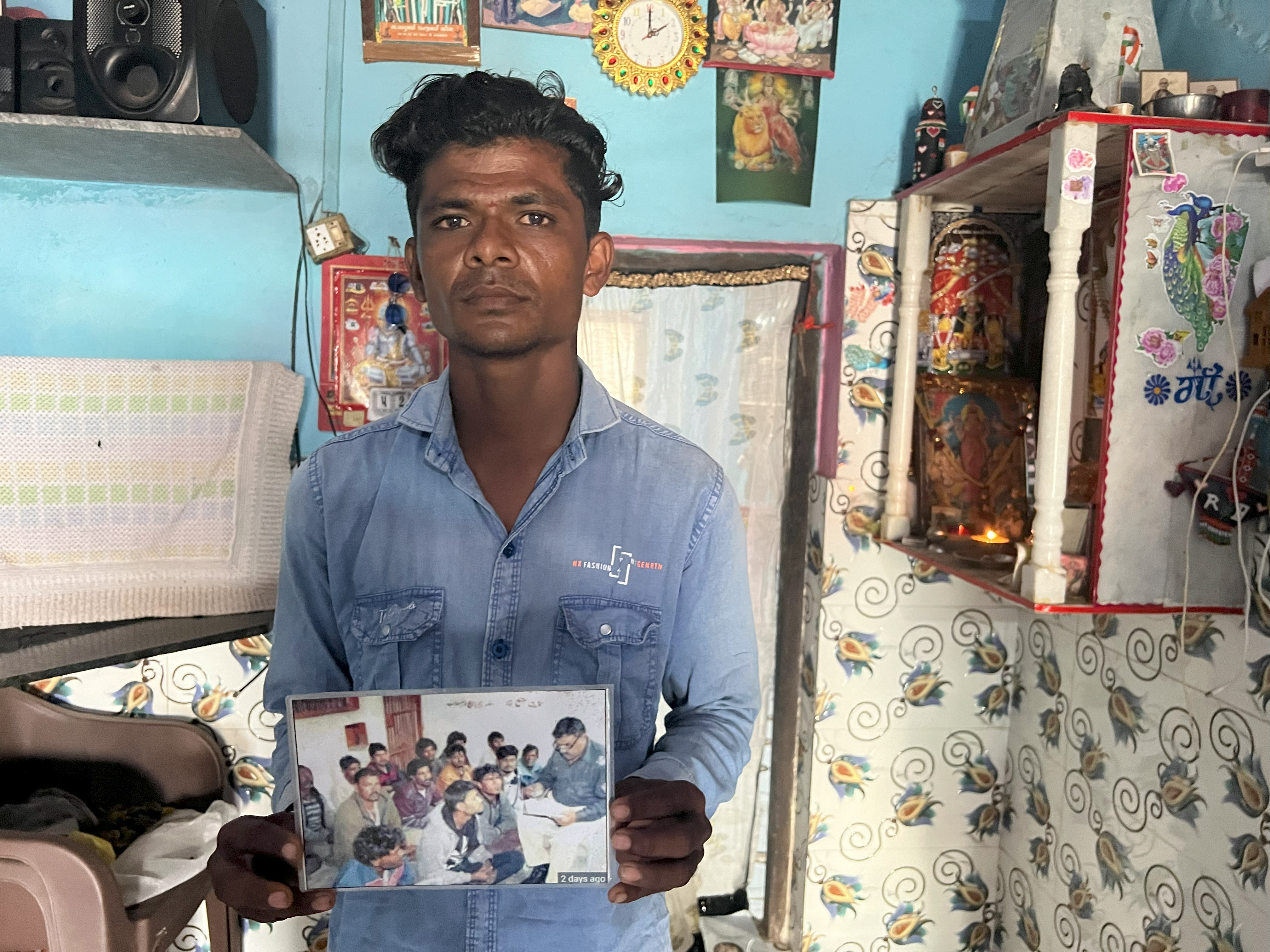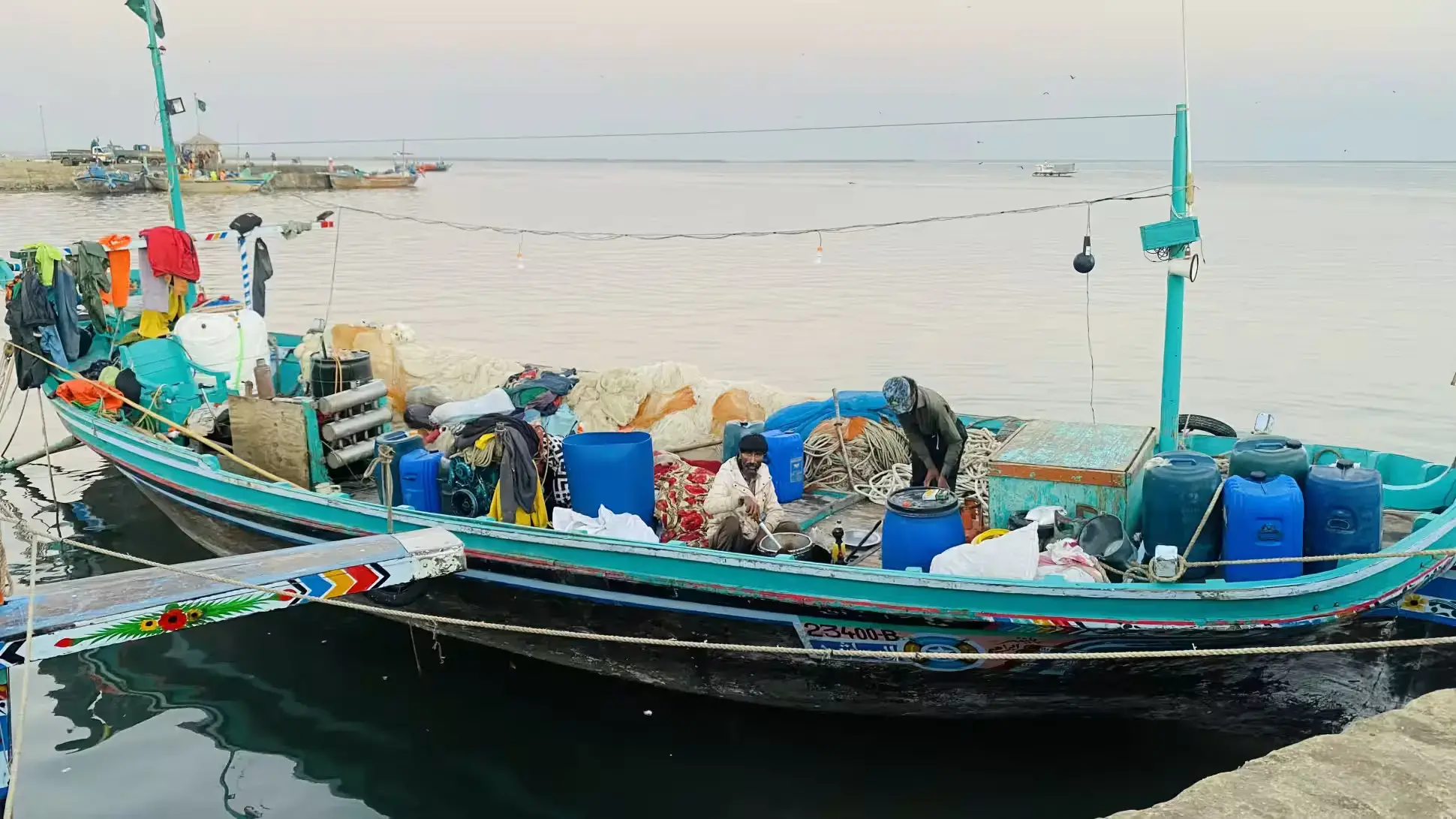
Hundreds who were arrested for trespassing released by Islamabad as politics shift
VERAVAL, India/KARACHI — Maniben, a 47-year-old widow in India's state of Gujarat, clutches her husband Bhupatbhai's final letter.
Bhupatbhai had been fishing in the Arabian Sea when he and his crew were detained by the Pakistan Maritime Security Agency (PMSA) for alleged territorial encroachment — joining hundreds of other fishermen similarly caught between the hostile nuclear-armed neighbors over the years. After about two years of silence, Bhupatbhai's letter arrived with other prisoners released in June 2023, assuring Maniben that he would be home soon.

As a nonprofit journalism organization, we depend on your support to fund more than 170 reporting projects every year on critical global and local issues. Donate any amount today to become a Pulitzer Center Champion and receive exclusive benefits!
Only his remains returned: He died of a heart attack in October, according to Anil, a fellow prisoner repatriated to India on Nov. 12.
"We lifted him and brought him to the cell door, shouting for help," recalled Anil, who spent over three years at Karachi's Malir prison. "No one came for 30 minutes. I believe if they had come sooner, his life could have been saved."
To the west in Pakistan's province of Sindh, there are similar stories of heartache and loss. Karachi resident Ameer Hussain, 70, said India's seven-year imprisonment of his son caused so much pain that he "contemplated suicide," while his other children were forced to quit school and start working.
Human rights activists say the arrests generally have little to do with border control. Rather, they say they reflect the animosity between the countries, disputed and unmarked maritime boundaries, and the effects of pollution and climate change.
But the latest figures exchanged between the Indian and Pakistani high commissions — as required twice a year under a consular agreement — show Pakistan released nearly 500 fishermen in 2023 alone, the most in two decades. As of Jan. 1, Pakistan had 184 in custody, down from 266 in July and 654 a year ago.
India was holding 81 Pakistani fishermen as of Jan. 1, up slightly from 74 in July.
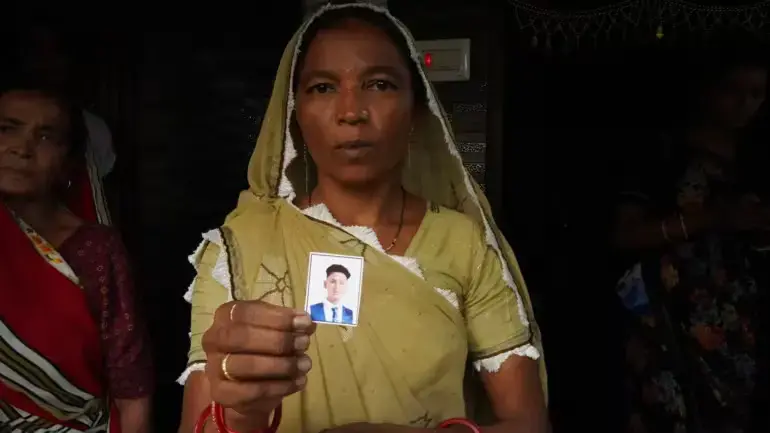
Pakistan's surge in releases followed dogged advocacy by the country's National Commission for Human Rights (NCHR). Some experts also see a connection to Pakistan's evolving political environment since Prime Minister Imran Khan was ousted in April 2022, while the Pakistan Muslim League-Nawaz (PML-N), which generally seeks better ties with India, became the favored party of the powerful military establishment.
"The major factor was the change of the government in Pakistan," said Mubasher Bukhari, a veteran journalist from Pakistan. "The PML-N and the PPP always focus on mending relationships with the neighboring countries including India," he said, referring to the coalition government that included the PML-N and Pakistan People's Party before it dissolved in August for a caretaker administration.
Some hope there might be an opening for further progress after elections due in both South Asian countries this year.
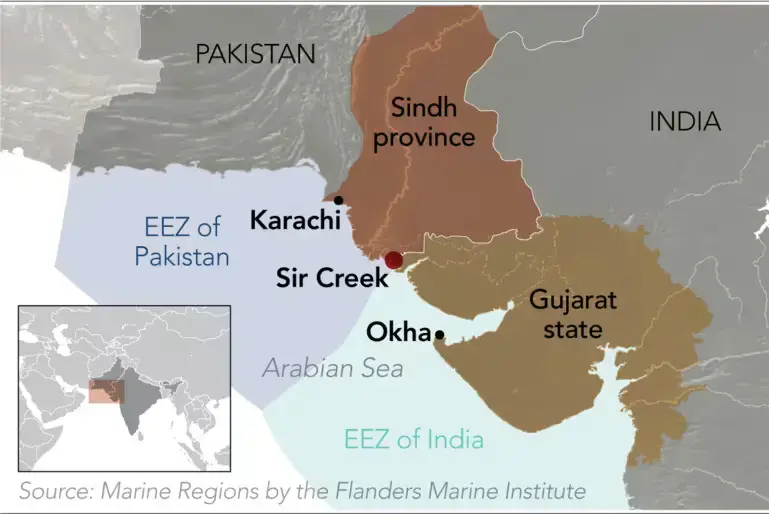
Pakistanis are usually caught near Sir Creek, an estuary in the wetlands between Gujarat and Sindh. India considers the boundary to be the midpoint of the winding creek, while Pakistan insists it is fixed to the east bank. Indians, meanwhile, are typically apprehended near the maritime boundary that extends 200 nautical miles from shore. The line, however, remains contentious due to the Sir Creek dispute.
"The direction of the river flow is contested," said Indian retired Commodore R.S. Vasan, who served in the navy and coast guard for 34 years. He said that a more westward flow would widen India's exclusive economic zone, while the reverse is true for Pakistan. "However, with seasonal and other variations, these remain contested, hence the issue of Sir Creek."
Vasan added that there is a 25-nautical mile no-fishing zone near the land border to avoid issues with fishermen crossing over.
But Rabiya Javeri, chair of the NCHR in Pakistan, said, "Because of the abundance of fish on the Pakistani side and the unclean water in Gujarat, many Indian fishermen come to our seas. Sometimes the wind pushes them to our side."
Coastal communities depend heavily on fishing for survival.
Jayantibhai Nangibhai Rathod, who owns several boats in Gujarat, explained that the port town of Okha is a key base. He said it costs around 400,000 Indian rupees ($4,800) for each trip, to cover crew wages, food, fuel, ice for storage and permits over 15 to 20 days. "If the captain fails to catch enough fish, it affects their reputation, making it difficult to get hired in the next fishing season. To enhance their performance, they often venture into deep seas. Unfortunately, this sometimes leads them too far, resulting in arrests."
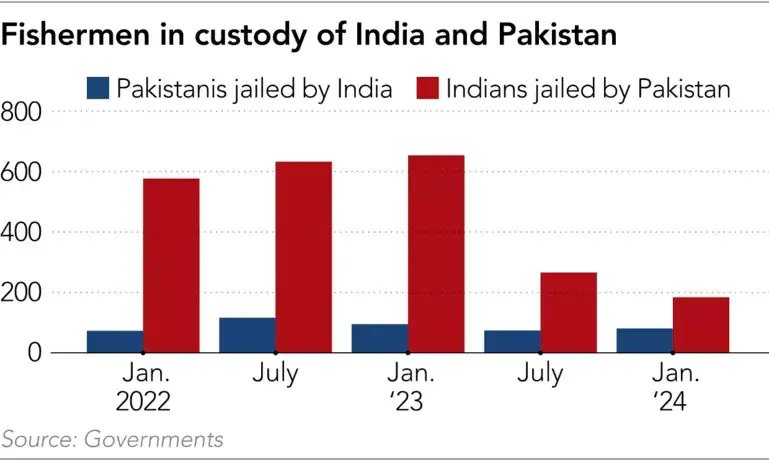
Some allege that authorities from each country enter the other's waters to nab crews.
"We were within Pakistani territory when we were arrested on Feb. 5, 2013," insisted Hussain from Pakistan, who was detained along with his son but released earlier. "I even showed them the GPS that I am inside the Pakistani border. But the Indian Coast Guard didn't listen."
Experts on both sides are skeptical.
"It is totally illegal for the PMSA to cross into India's territorial waters," said Vasan, the retired commodore, noting that such violations can be monitored by satellites. Javeri of Pakistan's rights commission agreed, saying, "It makes no logical sense for a coast guard to cross the border only to detain a poor fisherman."
A PMSA official who did not want to be identified was adamant that no fishermen are detained on the Indian side, and not even in disputed areas.
The fishermen that are arrested leave behind desperate families. India pays 300 rupees a day in compensation for those detained by Pakistan, but there is no such restitution for Pakistanis.
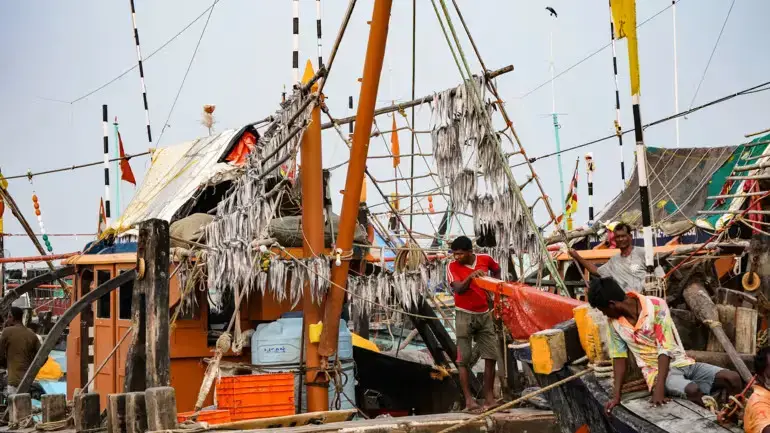
The worst part may be wondering about the fate of loved ones. "He asks me about his father, and I don't know what to tell him," said Gujarat's Sonal, 20, whose 2-year-old has yet to meet his father. "I myself don't know."
Mumtaz, a 40-year-old mother in Sindh, said there has been "no call, not even a message" since she learned her 20-year-old son was arrested two and a half years ago.
An official at Malir prison who requested anonymity told Nikkei that letters used to be allowed but were stopped during the pandemic. "The communication between the detained Indian fishermen and their families is being restricted by the government."
Jatin Desai, a 68-year-old journalist and peace activist, said he has urged Pakistani and Indian authorities alike to allow video calls. If there is concern about them passing sensitive information, he argued, authorities could supervise. "Why can't we do this?"
The answer may lie in the bitterness of the nations' decades-old rivalry. But even this ebbs and flows.
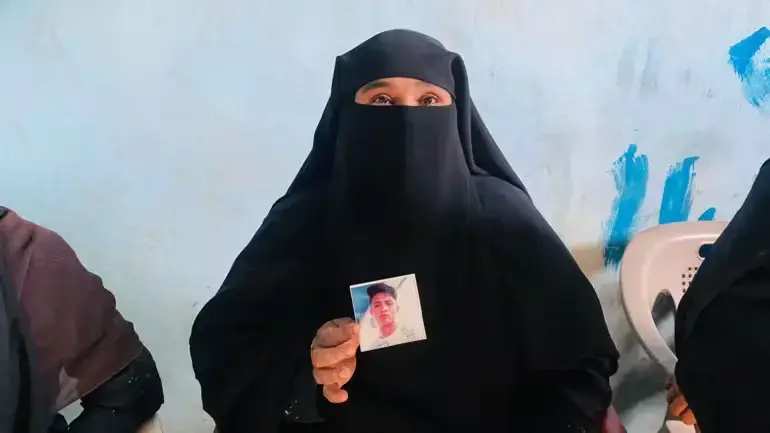
In 2007, the Indian and Pakistani foreign ministries formed a judicial committee of retired judges — four from each side — to look into the cases of civilians in prison, particularly fishermen. "A lot of things were accomplished because of this committee," Desai said, such as arranging medical care and resolving legal issues. "The committee was doing a phenomenal job, but then it stopped with its last meeting in 2013. No one knows why."
In 2008, the countries forged a consular agreement obliging them to list prisoners, among other provisions.
"That agreement is very interesting," Desai said. "There is a requirement that if someone is arrested in India or Pakistan, consular access must be granted within three months. ... Even though it doesn't happen, at least there is something on paper."
Prisoner releases are often timed as humanitarian gestures coinciding with holidays like Eid or Diwali, or when they are politically advantageous, Desai said. Much depends on the will of national leaders.
When Indian Prime Minister Narendra Modi took office in 2014, he extended invitations to regional leaders — including then-Pakistani Prime Minister Nawaz Sharif, who visited New Delhi in 2014. The following year, Modi became the first Indian prime minister to visit Pakistan in over a decade.
The two leaders did not revive the joint committee, but there were other goodwill moves. In 2015, Pakistan released 57 Indian fishing boats. "The actions taken were influenced by the prevailing political atmosphere," Desai said
Velji Kanjibhai Masani, national director of the All India Fishermen Association, who has made multiple visits to Pakistan to secure the release of fishermen and their boats, suggested relations became more difficult after cricket hero-turned-Islamist populist Imran Khan became Pakistan's prime minister in 2018.
But since his removal from office, Khan has been sidelined and jailed under a deluge of corruption allegations, which he denies. Sharif is widely expected to return to power in Feb. 8 polls with the tacit backing of the military, although there are growing concerns about the fate of democracy as well as a possible election delay. Modi, meanwhile, is poised to seek a third term in April and May.
Sharif in December called for better relations with India. "How can you achieve a global status when your neighbors are upset with you?" local media quoted him as saying.
Desai said that at present, ties with Pakistan are "not good." But "in the upcoming elections in Pakistan this year, the potential election of Nawaz Sharif to office raises hopes for the release of more Indians currently in custody there."
He added that in addition to the advocacy of Javeri and the NCHR, many prisoner releases occurred during the year and a half Nawaz's brother, Shehbaz Sharif, served as prime minister until August.
Whether the rival governments can overcome their intractable disputes is far from certain. But experts say small steps could make a big difference.
"Fishermen on both sides are illiterate. Both the governments know that they cross the border inadvertently, so why can't they adopt a policy of no arrest?" Desai asked.
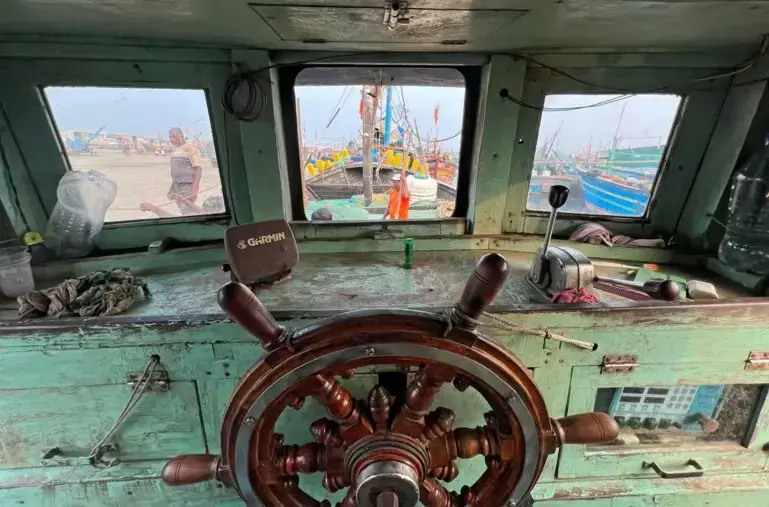
Vasan said officers have discretionary powers over whether to issue warnings, notify the corresponding authorities or make arrests. The anonymous PMSA official said that on at least one occasion, Pakistan did release some fishermen by alerting the Indian Coast Guard "as a friendly gesture."
Experts call for abiding by past agreements -- and a little compassion.
Anyone who enters the wrong waters "should be checked then and there and released if their identity is verified," said Masani. "Don't keep them longer than three months as mandated by the [consular] agreement. Both the governments should think of fishermen on humanitarian grounds."



